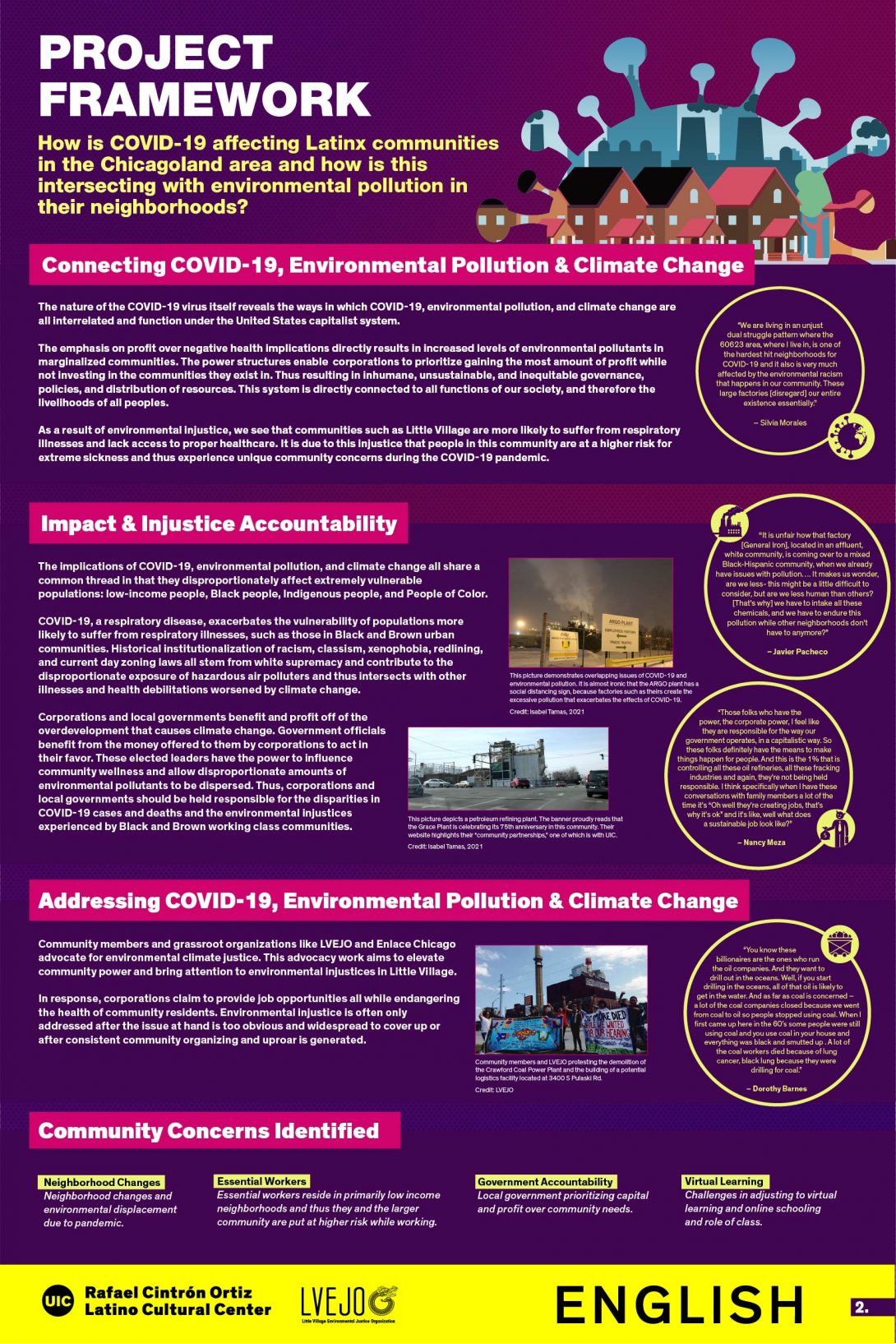Project Framework
How is COVID-19 affecting Latinx communities in the Chicagoland area and how is this intersecting with environmental pollution in their neighborhoods?
Project Framework Heading link

Connecting COVID-19, Environmental Pollution & Climate Change
The nature of the COVID-19 virus itself reveals the ways in which COVID-19, environmental pollution, and climate change are all interrelated and function under the United States capitalist system.
The emphasis on profit over negative health implications directly results in increased levels of environmental pollutants in marginalized communities. The power structures enable corporations to prioritize gaining the most amount of profit while not investing in the communities they exist in. Thus resulting in inhumane, unsustainable, and inequitable governance, policies, and distribution of resources. This system is directly connected to all functions of our society, and therefore the livelihoods of all peoples.
As a result of environmental injustice, we see that communities such as Little Village are more likely to suffer from respiratory illnesses and lack access to proper healthcare. It is due to this injustice that people in this community are at a higher risk for extreme sickness and thus experience unique community concerns during the COVID-19 pandemic.
“We are living in an unjust dual struggle pattern where the 60623 area, where I live in, is one of the hardest hit neighborhoods for COVID-19 and it also is very much affected by the environmental racism that happens in our community. These large factories [disregard] our entire existence essentially.” – Silvia Morales
Impact & Injustice Accountability
The implications of COVID-19, environmental pollution, and climate change all share a common thread in that they disproportionately affect extremely vulnerable populations: low-income people, Black people, Indigenous people, and People of Color.
COVID-19, a respiratory disease, exacerbates the vulnerability of populations more likely to suffer from respiratory illnesses, such as those in Black and Brown urban communities. Historical institutionalization of racism, classism, xenophobia, redlining, and current day zoning laws all stem from white supremacy and contribute to the disproportionate exposure of hazardous air polluters and thus intersects with other illnesses and health debilitations worsened by climate change.
Corporations and local governments benefit and profit off of the overdevelopment that causes climate change. Government officials benefit from the money offered to them by corporations to act in their favor. These elected leaders have the power to influence community wellness and allow disproportionate amounts of environmental pollutants to be dispersed. Thus, corporations and local governments should be held responsible for the disparities in COVID-19 cases and deaths and the environmental injustices experienced by Black and Brown working class communities.
“It is unfair how that factory [General Iron], located in an affluent, white community, is coming over to a mixed Black-Hispanic community, when we already have issues with pollution…. It makes us wonder, are we less- this might be a little difficult to consider, but are we less human than others? [That’s why] we have to intake all these chemicals, and we have to endure this pollution while other neighborhoods don’t have to anymore?” – Javier Pacheco
“Those folks who have the power, the corporate power, I feel like they are responsible for the way our government operates, in a capitalistic way. So these folks definitely have the means to make things happen for people. And this is the 1% that is controlling all these oil refineries, all these fracking industries and again, they’re not being held responsible. I think specifically when I have these conversations with family members a lot of the time it’s “Oh well they’re creating jobs, that’s why it’s ok” and it’s like, well what does a sustainable job look like?” – Nancy Meza
Addressing COVID-19, Environmental Pollution & Climate Change
Community members and grassroot organizations like LVEJO and Enlace Chicago advocate for environmental climate justice. This advocacy work aims to elevate community power and bring attention to environmental injustices in Little Village.
In response, corporations claim to provide job opportunities all while endangering the health of community residents. Environmental injustice is often only addressed after the issue at hand is too obvious and widespread to cover up or after consistent community organizing and uproar is generated.
“You know these billionaires are the ones who run the oil companies. And they want to drill out in the oceans. Well, if you start drilling in the oceans, all of that oil is likely to get in the water. And as far as coal is concerned – a lot of the coal companies closed because we went from coal to oil so people stopped using coal. When I first came up here in the 60’s some people were still using coal and you use coal in your house and everything was black and smutted up . A lot of the coal workers died because of lung cancer, black lung because they were drilling for coal.” – Dorothy Barnes
Community Concerns Identified
Neighborhood Changes Neighborhood changes and environmental displacement due to pandemic.
Essential Workers Essential workers reside in primarily low income neighborhoods and thus they and the larger community are put at higher risk while working.
Government Accountability Local government prioritizing capital and profit over community needs.
Virtual Learning Challenges in adjusting to virtual learning and online schooling and role of class.